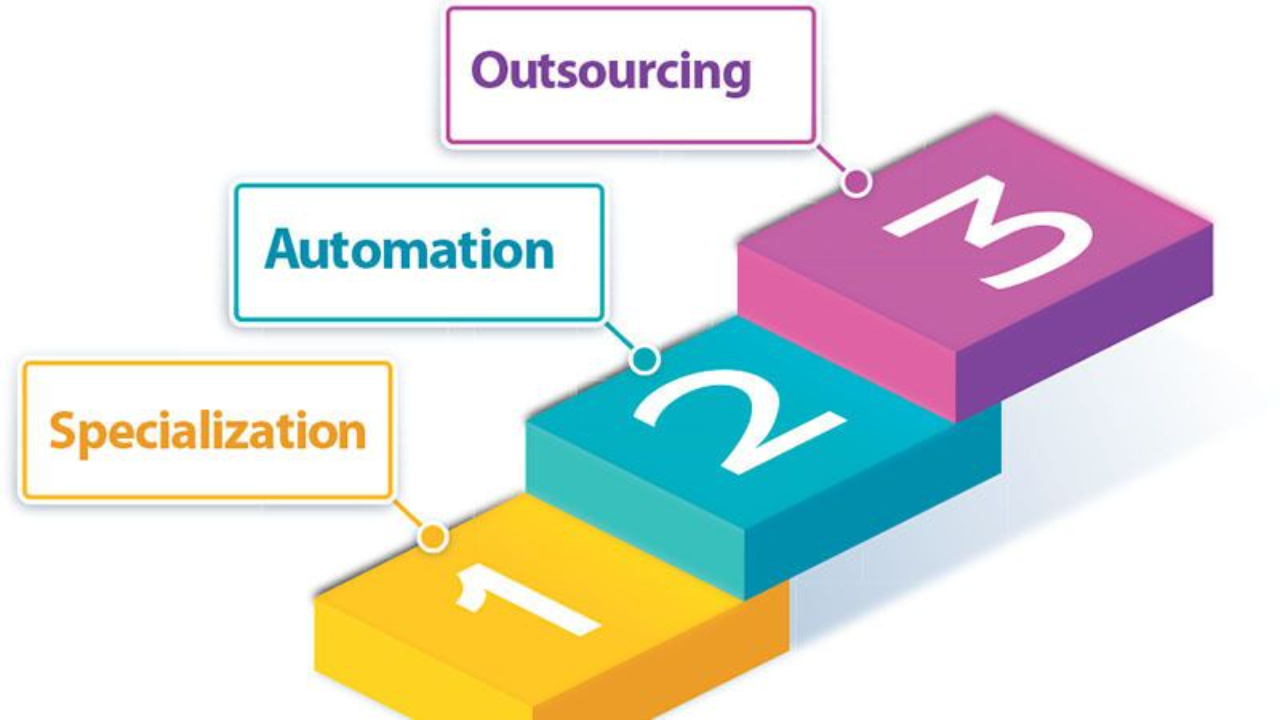Specialization, Automation, Outsourcing: 3 Steps to Protect Your Time

By Rob Buffington
As the labor market continues to be the single greatest difficulty of our industry, companies are exploring new ways to increase their Direct Labor Efficiency Ratio (DLER). This is traditionally achieved through one of three means: specialization, automation, or outsourcing. Specialization is the process of narrowing job duties so that each position is working on the same few tasks and thereby becoming more efficient at each. Automation refers to the use of software and processes to replace man hours with machine hours. Outsourcing can be delegating the position entirely, such as hiring a third-party accounting firm, or hiring remote workers from staffing agencies at a lower cost than domestic employees.
Specialization is one of the most important changes our industry needs to practice in order to advance. The portfolio mindset of 20 years ago still endures, with the property manager being responsible for all activities related to a property. The goal of specialization is that each person focuses on a select number of related tasks for a specified group of properties. This is different from a call center model where callers are speaking to a faceless, nameless individual who has no connection to your or your property, which leads to frustration and low quality. Instead, create positions for a specific set of tasks and then focus the people on a specific group of properties. This could be on a portfolio level, such as an ACAM, or a division level for something like a customer service rep.
As companies reach a certain size, new positions such as onboarding administration become viable. By creating a position to do nothing but onboarding, you allow a member of your team to become more efficient than a community manager would be, since a CAM isn’t onboarding new HOAs every month and would become rusty and forget the process. After a few months, an onboarding coordinator will know all of the right numbers for changing over utilities, have the filing and labeling system memorized, and not fall behind because of a last-minute maintenance issue or too many board meetings. Also, an onboarding coordinator will be easier to hire and train than a CAM, and they will expect a lower salary. The strength will be in the process rather than the person.
Many companies fear delegating a process to a lower level because they are concerned about sensitive data or QC. But consider the 90 percent rule. You don’t need to be able to delegate 100 percent of a task in order to utilize an admin staff with lower clearance or less experience. Continuing with the example of an onboarding coordinator, you may want to keep the banking information and funds transfer as well as the communication with the board for the CAM. However, that doesn’t mean that the onboarding coordinator can’t be responsible for everything else. As long as someone can take on 90 percent of a task without sacrificing quality or security, it is a good move.
Automation is a growing facet of our industry. More tasks are being automated by using the 90 percent rule. If you have a customer service department, bring in a smart AI for your online chat and texting communications. It’s not hard to develop or purchase an AI that can answer questions such as "What is my balance?" "How do I report a maintenance issue?" "How do I submit an ARC?" Will this AI be able to answer all questions? Absolutely not. But if you took a survey of most front-line calls, well over half of them could be answered with zero man-hours.
If you’re not ready to embrace Skynet just yet, start halfway and develop workflows and scripts for your front office and back office positions. If, for example, incoming messages contain the phrase "selling my unit," "condo docs," "CC&Rs," or "escrow," a workflow could be created so that they are assigned to the escrow department, and a script created with this response: "Dear homeowner, in order to get a copy of your escrow docs, please visit www.homewise.com." Nothing has been sent, so you still have a human eye on it before clicking send, but you’ve dropped the time and energy required to answer this from 120 seconds to 10. You’ve also ensured that the right answer is going out every time and decreased your average response time.
Finally, outsourcing is rapidly gaining traction in our industry. This can take the form of outsourcing services such as vendor screening through companies like Vendor Smart and Vive, escrow demands through Homewise Docs and CondoCert, or AP through Strongroom. It can also mean hiring full-time people through a staffing company from a wider geographic region, reducing your payroll anywhere from 30-60 percent and increasing your available hiring pool. Depending on your company’s size and needs, either or both can be a good option. You’ll find that HOAs are open to solutions that they wouldn’t have considered two or three years ago, such as permanent Zoom board meetings or fully remote management. Many companies are creating new positions of remote managers who will handle everything via Zoom and email.
None of these strategies is meant to be used on its own. All three are beneficial to every company and can be used in concert for greatest effect. By gradually finding new ways to apply each of these strategies, community managers can affect lasting and profitable change in our industry.
Rob Buffington is an experienced consultant in the HOA management space and brings a wealth of experience and knowledge to management companies and mid-size businesses that struggle with vendor services, staffing, bookkeeping, and overall management issues.
